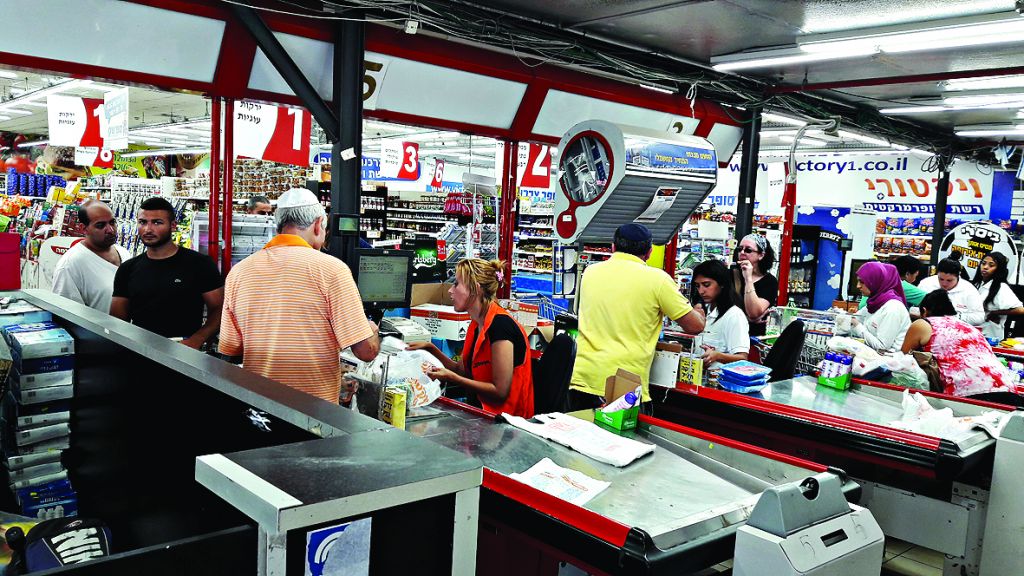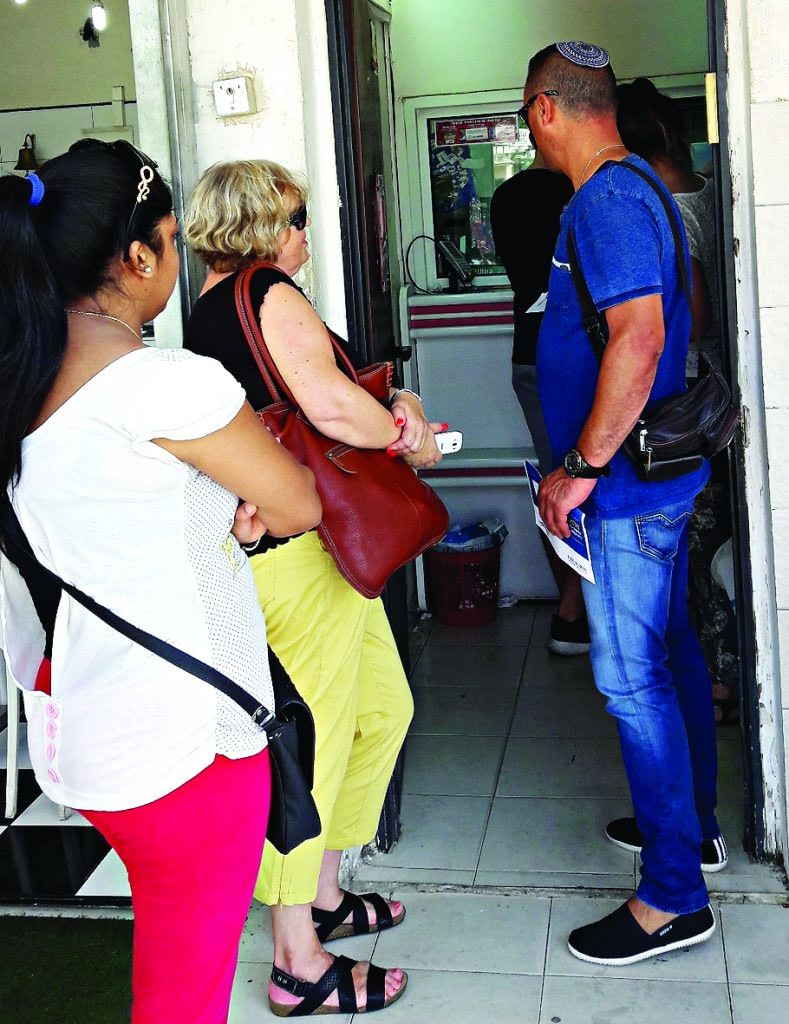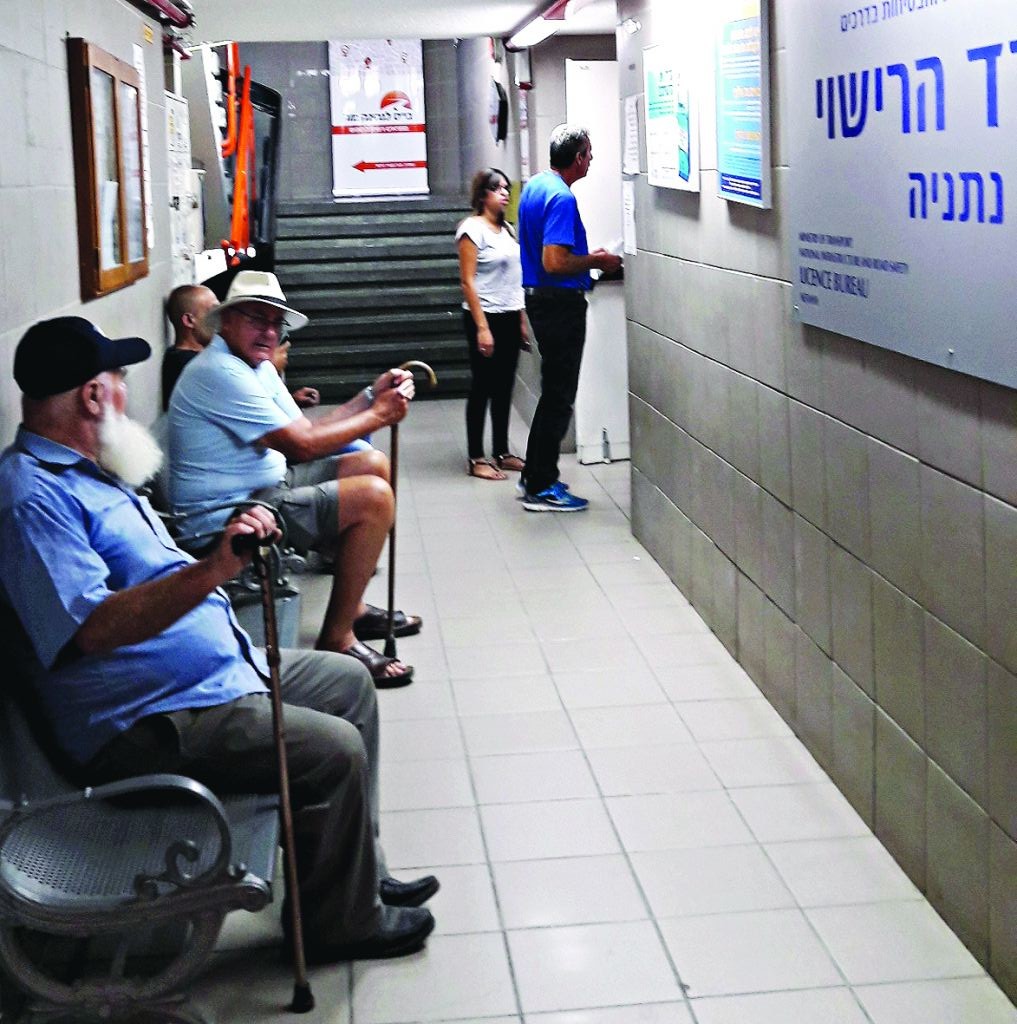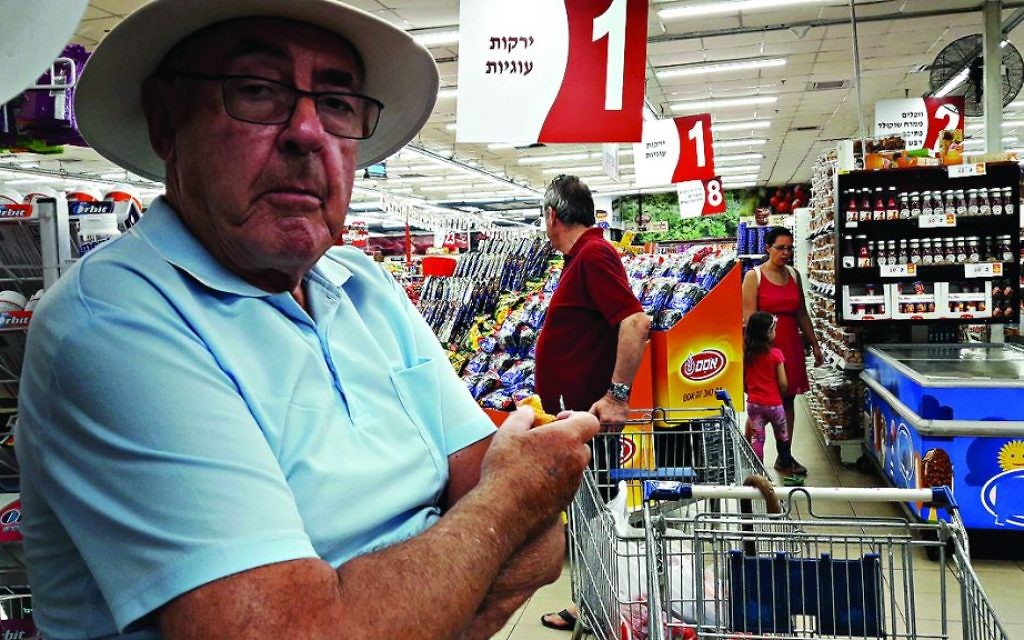Taking their Queue Tips – life behind the lines
Is it true Israelis hate to stand in line? Lisa Sanders [with her dad a willing helper] went to find out
In the “habits and customs” section of every Israeli guide book you’ll find a reference to The Queue. “Waiting in line is practically extinct” writes somebody called Abi from Rugby on one travel forum. “Queues of people at ticket windows and food counters remain chaotic,” chirps TripAdvisor. A man called “Reb Mordechai” has devoted an entire blog to documenting what he sees as Israeli infractions of the international etiquette covering queuing.
Enough already. Clearly proper rigorous research is needed to establish whether Israelis are so inept at queuing that foreigners have to be especially alerted. The perfect opportunity to do this came recently, after a Queuing Bill passed its first reading in the Knesset. The bill will exempt Israelis aged 80 and above from having to stand in line in public.
The social equality minister behind the initiative, Gila Gamliel, pointed out: “This is our duty as a society, even without enacting laws. And I have no doubt that as a result of the law, the issue will become a societal norm, making such legislation unnecessary in future.” Gamliel even quoted a biblical verse to back up the principle: “Stand up in the presence of the aged, show respect for the elderly.”
Get The Jewish News Daily Edition by email and never miss our top stories Free Sign Up
In the interests of documenting Israeli queuing culture, I pressed my dad into service as a kind of barometer. He loathes queuing, always has, and while he’s a youthful 76, he helpfully turned up for our assignment disguised as an “old person” – panama hat, walking stick, sturdy sandals.
Our first stop: the post office. My local is a tiny box of a place, presided over by Aliza, who has been postmistress there for 30 years. In larger post offices, customers have to take a numbered ticket and wait to be called to a counter. At Aliza’s, the queue simply straggles out on to the hot pavement, since only three people can cram inside at a push.
My dad finds a seat on the metal bench outside while I ask the classic Israeli queue question: “Who’s last?” This is how it works in a non-ticket-regulated queue. New arrivals must first ascertain who is in front of them.

“Me,” a woman says, with a heavy Russian accent. Nobody offers to let my dad go inside the post office ahead. Three people are huddled together completing a car-purchase transaction beside us. They struggle to examine the numerous documents while standing up in the queue.
A new woman arrives, but instead of joining the back inserts herself near the front. “I was here already, right?” she says loudly. Everyone tacitly accepts that she has gone off to fetch something, and has now returned to her original place.
“Do you think Israelis don’t know how to queue?” I ask my fellow queuers. They stare at me, blankly. “No comment”, the Russian says.
“I’ll take 50 shekels and you can all go in,” jokes a young man sitting beside my father.
When it’s our turn to squeeze inside, I clamber over umpteen bags of unopened mail to reach the glass window. Postmistress Aliza is hemmed in by Next Online and Ali Express parcels awaiting collection. I ask her what she thinks of the proposed law, whereby the elderly will be allowed straight to the front of the queue.
“Oh, I read about this. But we already have it,” she tells me. “Pensioners, disabled people, they carry a special card, which allows them to go to the front. But they don’t need to show me, I know everybody here anyway.”
“Really?” I ask her. We’re in a large urban area after all, not a village.

“Of course,” she says with a grin. “Everybody who comes here, I know them all.” She greets the deliveryman who dumps two more gigantic sacks of mail at my feet, thereby taking up all the floor space available. “Please don’t take any photos of this,” Aliza begs me. “We’re going to renovate, so it’s going to get better.”
Next stop: the car licensing office, Israel’s DVLA. Here you take a ticket outside, get your bags checked by security and sit inside a large air-conditioned room to await your turn at one of a dozen counters. There are plenty of seats and the 50 or so people waiting are doing so calmly, looking at their phones. After several minutes of this, it’s my dad who notices nobody’s moving. I check. Sure enough, nobody’s lining up at the counters.
“The computers are all down,” Tawfek Hajeha, sitting in front, tells us. He’s a builder, he says, who took a day off work to get the form stamped for his MOT test. “I got here at 7.30am and waited until they opened at 8am. Then when they opened, the computer didn’t work.”
Is he angry? He shrugs, non-committal. Would he be happy to let over-80s in first? “Absolutely,” he says. “If they’re still driving, good for them.”

Mohamed Kashkash sits across from us. “I’ve come here after two hours in the Interior Ministry,” he says. “I needed a replacement bit for my ID card.” Despite having spent four hours that day in two different queues, he’s cheerful. He’s trying to get his driving licence reinstated but is still banned for another month and will need to complete a driver-retraining course.
When we leave, the computers are still down. Everyone is still waiting quietly. There’s no shouting or complaining, just quiet camaraderie. I make a mental note that, contrary to the clichés about hot-tempered Israelis, people here do have savlanut – patience. This might be the Start-Up nation, but bureaucracy is still slow and unwieldy.
Last stop, the supermarket. And this is where, honestly, all hell breaks loose. I pile my trolley with my weekly shop, and we join the back of a long straggling queue. Of 13 checkout tills, only three are manned. My dad starts hamming it up a bit; puffing and groaning and acting “old”. He just hates queues, but only I know that. The man in front of us abandons his trolley to get more items from the shelves. It’s hot, and the shoppers are irritated. Tempers flare; customers are forced to wait repeatedly every time there’s a price query about various two-for-one or three-for-two deals. We are still an agonising seven people back from the checkout. My frozen salmon is sweating.
I ask the grim-faced people around me if they’d give up their spot so my dad can go first. They pretend they cannot hear me.
“Your card is out of date,” the checkout girl says, when we finally get to the till. “Can’t be,” I tell her. “Try again.” This is the store club card. Without it, my two-for-one and three-for-two offers will be invalid. She pushes the bell for the manager. We have to wait.
While we do so, we endure the tutting and staring from our fellow queuers. Eventually Sigi, the deputy manager comes over, reprimands the checkout girl, beeps my card through.
Again we get stuck. “This meat’s not on special offer,” the checkout girl tells me.
“Yes, it is. I know it is. You have a sign on the freezer which says it is.”
“Isn’t,” she tells me flatly. Furious, I push my way back through the queue and go off to take a photograph of the sign on the freezer.
“See?” I show her. “No,” she tells me patiently. “You have a different kind of meat. This is brisket.”
“It says brisket! I have brisket!” I’m shouting now. All pride deserts me.
Shaking her head, she nevertheless presses the bell and we must wait again for Sigi. It is a long wait.
“Good grief! Is it always this bad?” My dad can’t believe it. He lives alone and shops in a small local grocery store.
In an attempt to distract my dad, I ask him to go and photograph the queue. In a flash, Sigi is beside him, shouting. He ignores her since he doesn’t speak Hebrew. I leap in. “You can’t photograph in here!” she screams. “If you want to photograph, go get permission from head office!”
I assure her I’m harmless, and ask if she can please clarify the price of my brisket, so that we can leave.
She does. Nobody apologises. Before she dashes off to man another crisis, I ask her about the new law. Would it help to let older people go first, so they don’t have to queue?
“Oh, we already have a queue like that,” she says, pointing. “It’s till number 13.”
I look. “But it’s not open.”
“Not yet,” she tells me, already bustling away from me. “We’re going to open it soon. When it’s really busy.”

Thank you for helping to make Jewish News the leading source of news and opinion for the UK Jewish community. Today we're asking for your invaluable help to continue putting our community first in everything we do.
For as little as £5 a month you can help sustain the vital work we do in celebrating and standing up for Jewish life in Britain.
Jewish News holds our community together and keeps us connected. Like a synagogue, it’s where people turn to feel part of something bigger. It also proudly shows the rest of Britain the vibrancy and rich culture of modern Jewish life.
You can make a quick and easy one-off or monthly contribution of £5, £10, £20 or any other sum you’re comfortable with.
100% of your donation will help us continue celebrating our community, in all its dynamic diversity...
Engaging
Being a community platform means so much more than producing a newspaper and website. One of our proudest roles is media partnering with our invaluable charities to amplify the outstanding work they do to help us all.
Celebrating
There’s no shortage of oys in the world but Jewish News takes every opportunity to celebrate the joys too, through projects like Night of Heroes, 40 Under 40 and other compelling countdowns that make the community kvell with pride.
Pioneering
In the first collaboration between media outlets from different faiths, Jewish News worked with British Muslim TV and Church Times to produce a list of young activists leading the way on interfaith understanding.
Campaigning
Royal Mail issued a stamp honouring Holocaust hero Sir Nicholas Winton after a Jewish News campaign attracted more than 100,000 backers. Jewish Newsalso produces special editions of the paper highlighting pressing issues including mental health and Holocaust remembrance.
Easy access
In an age when news is readily accessible, Jewish News provides high-quality content free online and offline, removing any financial barriers to connecting people.
Voice of our community to wider society
The Jewish News team regularly appears on TV, radio and on the pages of the national press to comment on stories about the Jewish community. Easy access to the paper on the streets of London also means Jewish News provides an invaluable window into the community for the country at large.
We hope you agree all this is worth preserving.
-
By Brigit Grant
-
By Laurent Vaughan - Senior Associate (Bishop & Sewell Solicitors)
-
By Laurent Vaughan - Senior Associate (Bishop & Sewell Solicitors)
-
By Laurent Vaughan - Senior Associate (Bishop & Sewell Solicitors)
-
By Laurent Vaughan - Senior Associate (Bishop & Sewell Solicitors)






















